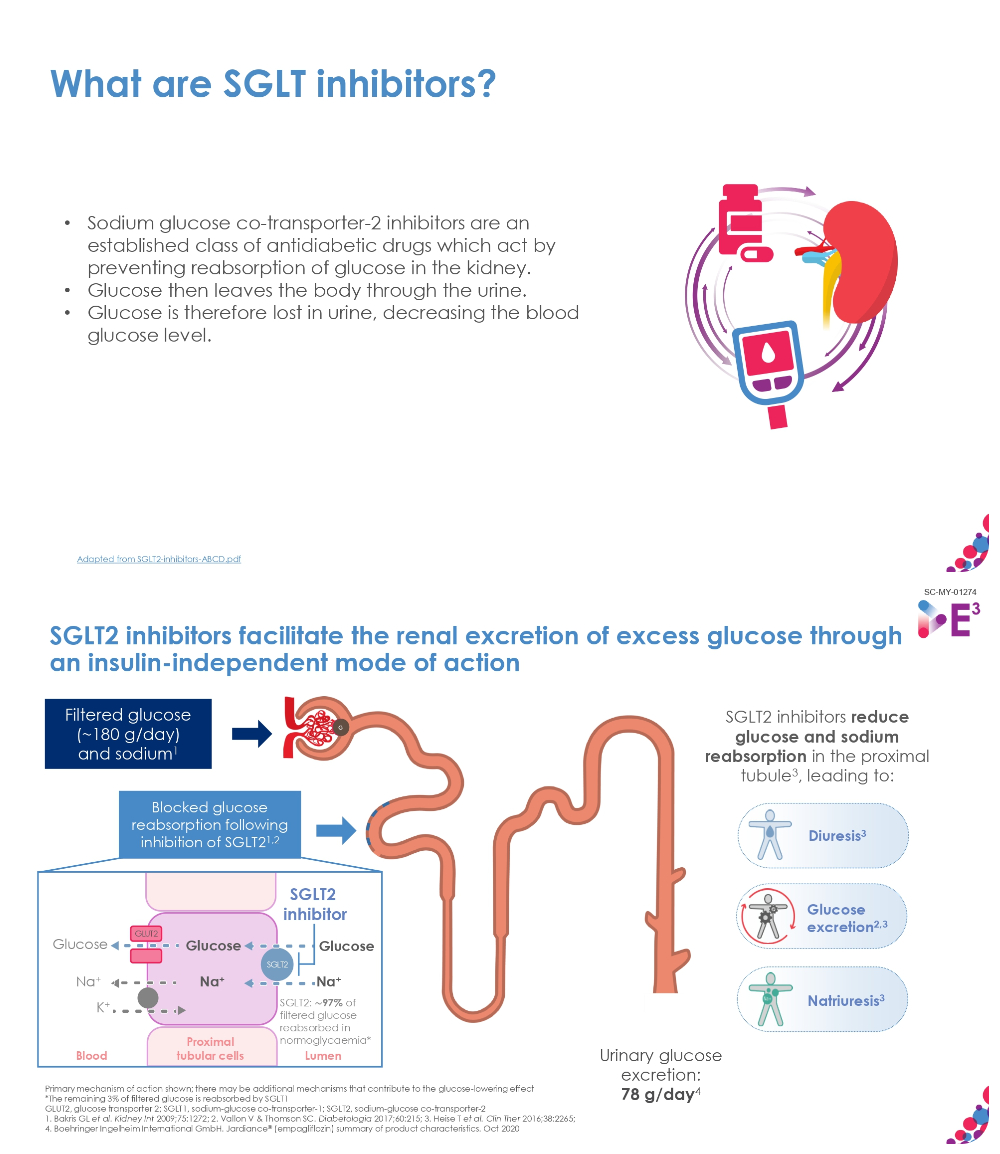DIABETES and heart disease often go hand in hand.
The former affects over 3.9 million Malaysian adults based on the National Health and Morbidity Survey 2019, specifically 2.8 million adults (above the age of 30) with type 2 diabetes (T2D).
Research has shown that patients with T2D are two to four times more likely to develop heart failure compared to someone without diabetes. Raised blood glucose levels contribute 10-11% to risk of heart failure.
While diabetes can cause a myriad of complications, heart disease is one that is often overlooked. Approximately 6.7% of Malaysians live with heart failure and it is an major cause of hospitalisation in Malaysia.
So what do all these staggering numbers mean in simple terms? Better awareness on gaining appropriate information and support, of course.
That said, before we get to how patients can make better decisions and learn the skills to properly manage their condition, it’s best to lay down the necessary information for those who are not yet at risk to emphasise the importance of the present discussions.
What are the risks in question?

Providing us with an overview of diabetes and heart disease, National Heart Institute (IJN), Malaysia consultant cardiologist Datuk Dr Azmee Mohd Ghazi shared what it means to be diagnosed with T2D during a recent one-on-one interview in commemoration of International Diabetes Day, to raise better health awareness among our readers.
“Type 2 diabetes or T2D is a common type of diabetes that a patient develops later in life, and it could either be due to genetic predisposition or lifestyle factors (individual habits).
“The body is so used to high sugar/glucose intake that it becomes resistant to it, where the pancreas does not produce enough insulin to entirely process the sugar/glucose,” said Azmee.
Other main types of diabetes are Type 1, which is an autoimmune reaction where the body attacks itself by mistake and stops the body from making insulin, and Gestational diabetes which is developed solely among pregnant women.
Addressing the concern of some patients who would like to stay away from taking medication, or in this case insulin injections to avoid being dependent towards it, “The reason you are being advised by your doctor to take the insulin injections may well be because your body does not produce enough insulin anymore”.
“In a way you will have to take it for the rest of your life, but it is for your well-being,” shared the cardiologist.
“Generally for doctors, even for myself, we will start by accessing patients’ lifestyle habits and advice on their dietary, weight reduction (if needed) and exercise routines first before any medication is prescribed."
“While diabetic patients may not actually suffer directly from their condition, effects from a poorly controlled diabetes does lead to other complications in the long-run that can be fatal.”
“The most health problems would affect the kidney, disease of the eye/retina (retinopathy), and of course coronary artery disease (blockage of the artery) which causes heart attack or heart failure,” highlighted Azmee.

To understand the impact of a poorly controlled diabetic condition, the doctor helped to specify it further.
“Diabetic nephropathy (kidney disease) is common in patients with T2D and retinopathy can cause blindness. People when they know this are genuinely afraid of losing their vision, so their awareness heightens,” he said.
“Peripheral vascular disease can happen too and it relates to issues of blood supply to the legs, arms and brain, which causes stroke.
“Diabetes can also lead to problems with gangrene or the risk of a non-healing ulcer. So, if you cut yourself, you may not recover fast where infections can happen because of the poor blood supply,” he added.
Peripheral neuropathy (losing the sensation of your limbs) is also another medical consequence.
“One may initially feel a tingling sensation in the arms/legs, but at some point a diabetic patient managing their condition poorly may lose all sense of feeling in his/her limbs.
“This is considered harmful because you may not be aware if you injure yourself in some way,” added Azmee, highlighting warning signs for such would usually be numbness, and blackened skin which indicates the state to be necrotic (Ie. decay of tissue due to not enough blood supply).
Other known abnormalities
The IJN cardiology department deputy head and Heart Failure & Heart Transplant clinical director noted: “For coronary artery disease, one would only develop symptoms when the condition of the heart is already very bad”.
“When we talk about heart disease, most of the time it concerns a heart attack.
“The five major risk factors that lead to a heart attack include diabetes, hypertension, cholesterol issues, cigarette smoking and family history.
“With diabetes being among the top, it’s pertinent for a diabetic patient to control their condition to avoid unwanted complications that may further deteriorate his/her health,” stressed Azmee.

“Some people don’t even know that they are diabetic until they actually get their sugar levels checked,” he added. “Don’t think that your family is free of diabetes that you are not going to develop it”.
“Our society consumes high amounts of carbohydrates and sugary drinks – fast food being the main challenge – where our habits have been built since young,” he said, emphasising to not wait until symptoms develop to start taking precautions, if one is still has good health.
The cardiologist also helped to detail the symptoms of diabetes and heart disease separately.
For those suffering from diabetes, the signs include:
- Constantly hungry
- Always tired
- Excessive thirst
- Frequent urination
- Excessive weight loss
“An individual may usually suffer such symptoms because their condition is poorly managed.
“However, usually after diagnosis the symptoms may reduce and the body may function normally once the diabetes is controlled, provided there are no further complications (those previously mentioned) that the condition may cause,” said Azmee.
Meanwhile, among the symptoms of someone suffering from a heart disease:
- Shortness of breath
- Chest pain
- Heart palpitation with dizziness
- Inability to conduct normal activity well (cannot walk / climb stairs)
- Water retention which causes leg or abdominal swelling
Feeling a little lightheaded after the thorough explanation?
Don’t turn away just yet because this discussion could truly help you gain the information needed to live well with diabetes or help in the care of someone close who is suffering from it.
The least that you can gain from this article is preventing yourself from being diagnosed in the first place by gaining detailed insights.
Diabetes and heart failure are linked; treatment should be too
The strong link between diabetes and heart disease is discussed more intently further during our interview with the cardiologist.
Azmee helped to emphasise the significance behind the results of the latest Emperor-Preserved (EMPEROR-P) clinical trial announced by pharmaceutical company Boehringer Ingelheim, which tells the usage of the sodium glucose co-transporter-2 (SGLT2) inhibitor as an effective medication in the risk reduction of cardiovascular death or hospitalisation for heart failure.
The interesting take away from the news is that SGLT2 inhibitors are an established class of antidiabetic drugs which act by preventing reabsorption of glucose in the kidney.

“Basically, this treatment is actually a diabetes medication, and doctors are used to prescribing it to diabetic patients,” he highlighted.
“Just to give you a bit of a background, there are usually three types of heart failure conditions; i) Heart failure with reduced ejection fraction, ii) Heart failure with mildly reduced ejection fraction and iii) Heart failure with preserved ejection fraction.
“The first and second types mentioned already have multiple (even dedicated) treatments available to help manage the conditions.
“The third had no specific treatment available, not until the results of the clinical trial were shared. Prior to it, specialists could not administer anything to improve the outcome of patients suffering from it, and unfortunately patients suffering from preserved ejection fraction were often overlooked,” said Azmee, describing the trial to be “... a landmark trial with effective outcome”.
The information is considered a big benefit to cardiologists because the SGLT2 inhibitor demonstrated an impressive 21% relative risk reduction.
“We do know that patients with heart failure will generally come back to the hospital because of acute heart failure even after going through primary treatments,” shared the cardiologist.
Patients with heart failure will see their doctors very frequently to optimise medication and prevent hospitalisation. But in an event of a decomposition, “... patients will need to come in to get stabilised, at times once in every three-months”
“They will have to be admitted and the issue is that everytime they go through the ordeal, their prognosis gets worse.
“So, realising the SGLT2 inhibitor as a good outcome measure helps in patients’ long term care,” said Azmee, noting that the treatment is also viable across all the three types of heart failure conditions.
Putting a healthy mindset first
A healthy Malaysia goes beyond access, “... and the only thing is to accept that prevention is better than (the) cure,” noted Azmee.
He shares that even if one detects a medical condition early, the chance is far greater than willfully ignoring early treatments to improve health and prevent it from further deteriorating.

“But even if you have been diagnosed with early signs, it does not necessarily mean that you need to go straight away for treatment. Lifestyle changes can help put your conditions under control and reverse the symptoms."
According to the consultant cardiologist, there have been patients in their early 30s that have come in for consultation with borderline hypertension.
“I don’t put them on medication straight away, in fact I will ask them to do lifestyle changes. (i.e. exercise to lose weight, reduce blood pressure). Basically introducing a lot of intervention to address the given condition,” he said.
“I believe people at large should start to know their numbers as early as possible.
“By this I mean your blood pressure, sugar, and cholesterol levels. Be more aware of your weight too. Not knowing will somewhat be lying to ourselves,” noted Azmee.
“At IJN, there is a KPI related to personal development for staff to manage our weight so that it is within a safe and healthy reading. It’s not necessarily discriminatory, but more of an encouragement at taking control of your well-being consciously.
“Companies looking at prevention monitoring don’t have to always rely on hospital intervention. There are so many people who are trained with services that help us carry a positive and healthy mindset,” he added.
The doctor agrees the reason why habits are hard to break is because of the ignorance seen as a bliss concept. People are scared of knowing their health, which is probably the greatest hurdle to overcome the statistics mentioned at the start of this article.
“Employers, schools and parents/guardians at home need to maintain a certain responsibility to train people to take better control of their health.
“Cost implication makes it hard and I suppose if future incentives or tax waivers are introduced it can hopefully help encourage people to improve conditions better.
“I think what we can learn from Covid and how we practice the importance of social distancing is that engaging in a continuous discussion to raise awareness is key,” shared Azmee. – The Vibes, November 14, 2021






._Credits_-_Unsplash_licence_via_360info.org.png)















